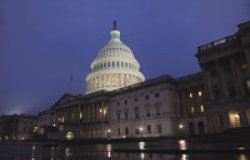U.S. Policy Towards Mexico: Opportunities and Challenges
Harriet C. Babbitt, Attorney, Jennings, Strouss and Salmon, and Former U.S. Ambassador to the Organization of American States; James Jones, Chairman, Manatt Jones Global Strategies, and former U.S. Ambassador to Mexico and Member of Congress; Andrew Selee, Director, Mexico Institute, Woodrow Wilson Center
Overview
On February 24, 2009, Wilson Center on the Hill and the Mexico Institute hosted a seminar featuring Ambassador James Jones, the Chairman of Manatt Jones Global Strategies, a former U.S. Ambassador to Mexico, and Member of Congress, and Ambassador Harriet Babbitt, an attorney at Jennings, Strouss & Salmon, PLC, and former U.S. Ambassador to the Organization of American States and Wilson Center scholar. Andrew Selee, director of the Mexico Institute at the Woodrow Wilson Center, moderated the discussion.
Ambassador Jones addressed the importance of the North American Free Trade Agreement (NAFTA) and immigration policy to the bilateral relationship with Mexico. He argued that NAFTA has been a success by economic measures, as income and trade in Mexico, the United States, and Canada has increased. It has also created more streamlined business practices in the three countries. Despite these advances, he noted, still a full half of the Mexican population sees no tangible benefit of NAFTA. Jones suggested that the Obama and Calderón administrations should work together to expand the reach of the benefits of NAFTA, perhaps jointly reexamining the agreements on labor and the environment.
Jones emphasized the need to readdress U.S. immigration policy. He suggested that as long as jobs are available in the United States, Mexicans will continue to enter the country illegally; a physical wall on the border will not be effective in significantly reducing undocumented crossings. More plausible ways to reduce illegal immigration, he added, might include a crack down on American employers who hire undocumented immigrants, an increase in the immigration quota for service workers which would approach the estimated demand in the United States for 500,000 workers, rather than the current quota of 50,000, and more creativity about job creation in Mexico. Certifying Mexicans hospitals as Medicare providers, for instance, would allow eligible ex-patriots living in Mexico to have access to quality healthcare and would also create well-paying jobs for Mexicans.
Ambassador Babbitt addressed Mexican and U.S. efforts to combat organized crime organizations in Mexico. Drug-related violence in Mexico has claimed more than 7,000 lives in the past two years, and efforts to reduce the supply channels have been difficult. As with past efforts in Latin America, when supply has been disrupted in one area, traffickers have scattered like "cockroaches" to other regions and continued their business. To truly reduce the violence associated with the drug trade, Babbitt pointed to U.S. drug consumption and arms trafficking. Each year, between fifteen and twenty billion dollars is transferred to Mexican cartels in the form of bulk cash and weapons. Ninety percent of weapons confiscated from drug cartels by the Mexican police were purchased in and smuggled from United States. These factors, she argued, represent the true power base for Mexican cartels.
Babbitt also recommended that the United States should focus on building a common agenda with Mexico and not only solely based on the crisis of the security situation and the challenges of immigration. Points of collaboration could include shared strategies facing climate change and health care reform.
By Andrew McNamara and Elizabeth Byers
Kent Hughes, Director, STAGE Program
Hosted By

Mexico Institute
The Mexico Institute seeks to improve understanding, communication, and cooperation between Mexico and the United States by promoting original research, encouraging public discussion, and proposing policy options for enhancing the bilateral relationship. A binational Advisory Board, chaired by Luis Téllez and Earl Anthony Wayne, oversees the work of the Mexico Institute. Read more
Thank you for your interest in this event. Please send any feedback or questions to our Events staff.
